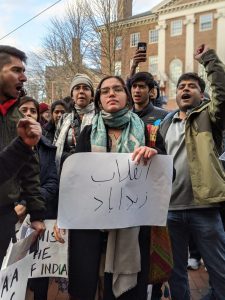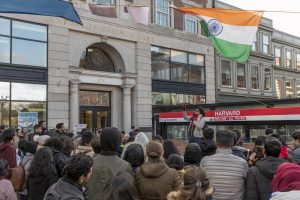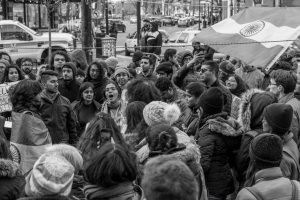Anti CAA protest staged by Harvard students in Boston, USA

TwoCircles.net
Harvard student community observed the first 24-hour anti-CAA protest in Boston, US on the occasion of Republic Day of India. This protest started at Harvard Square midnight at Eastern Standard Time of Republic Day
According to the information given in press note issued from the Harvard student community, Students and representatives from the Indian diaspora in the greater Boston area gathered together and staged a 24-hour protest at Harvard Square on India’s Republic Day. The people gathered to protest against the Citizenship Amendment Act (CAA) through songs, poetry, speeches, and the reading of the preamble of the Indian Constitution to remind each other of the secular and democratic principles India was built on.

The mode and form of protest, and link with global protests: The protest in Boston was just one of several protests seen all over India, as well as, the world. New York, Chicago, Washington D.C., Atlanta, and San Francisco were other US cities where various forms of protests were observed today. The protestors in Boston adopted the 24-hour protest on Republic Day as a way to show solidarity with compatriots on constant protest in Shaheen Bagh. Ghantagarh, and other places all over India, in the cold, and through the night, while recalling and upholding the values of the Indian Constitution.
Content of protestors’ views:
Hindustan ke mukhtar hai hum, kirayedar nahi
Mera haq mera wajood hai, tumhara ehsaan nahi
(An owner of India, not a tenant
My rights stem from my existence, not your favor)
-Jaspal Singh, Boston
Protestors expressed a diversity of views while generously offering chai, samosas, poha etc. to all those who dropped by. Some drafted original compositions, others recited works of Faiz, Tagore, and Rahat Indori. One protestor expressed his anger at the idea that a democratically elected government would ask its own voters to prove their citizenship. Another protestor passionately sang the full version of India’s national anthem, originally composed by Rabindranath Tagore. She spoke about how the Citizenship Amendment Act stood against the spirit of the anthem itself, which held up humanity as its highest ideal, irrespective of religious affiliation.
[caption id="attachment_434175" align="aligncenter" width="641"] Suraj Yengde is writer of CASTE MATTERS book[/caption]
Suraj Yengde is writer of CASTE MATTERS book[/caption]
Several protestors also invoked Ambedkar’s warnings at the Constituent Assembly, where he said “If things go wrong under the new Constitution, the reason will not be that we had a bad Constitution. What we will have to say is that man was vile.” MIT Professor Dwai Banerjee along with other community members, rightfully raised the question of “belonging” and what it is that the motherland truly strives for.
Dr. Suraj Yengde, a post-doctoral researcher at Harvard University, urged the audience to challenge the Hindu-Muslim dichotomy at the heart of Hindutva, pointing out that a monolithic Hindu identity suppresses the identities of Dalits, Adivasis, and many other communities with distinct traditions and histories. He highlighted the tragic death in Bangalore today of a Dalit, Sidappa, who died while manual scavenging, an act illegal in India since 2013. Just as Siddappa died despite preventive laws, a secular Constitution was by itself insufficient - it needed political action to make it a reality.

Members of the Indian diaspora spoke about how although the current ruling party in India enjoyed some support from the diaspora, a significant share of the members stood vehemently against their divisive politics and laws. Such voices from the diaspora can and would make a difference by strengthening the world-wide movement against discrimination. Lastly, Dr. Ruha Shadab, a student at the Harvard Kennedy School, hoped that this form of protest spanning 24 hours, would encourage more such demonstrations in the US.
The cold Boston rain could not dampen the spirits of these young protestors who all heeded the clarion call of a Constitution in need. As all the protestors of this small diaspora would say, the causality of this protest is uncertain but the feeling of hope in our guts is certain.
